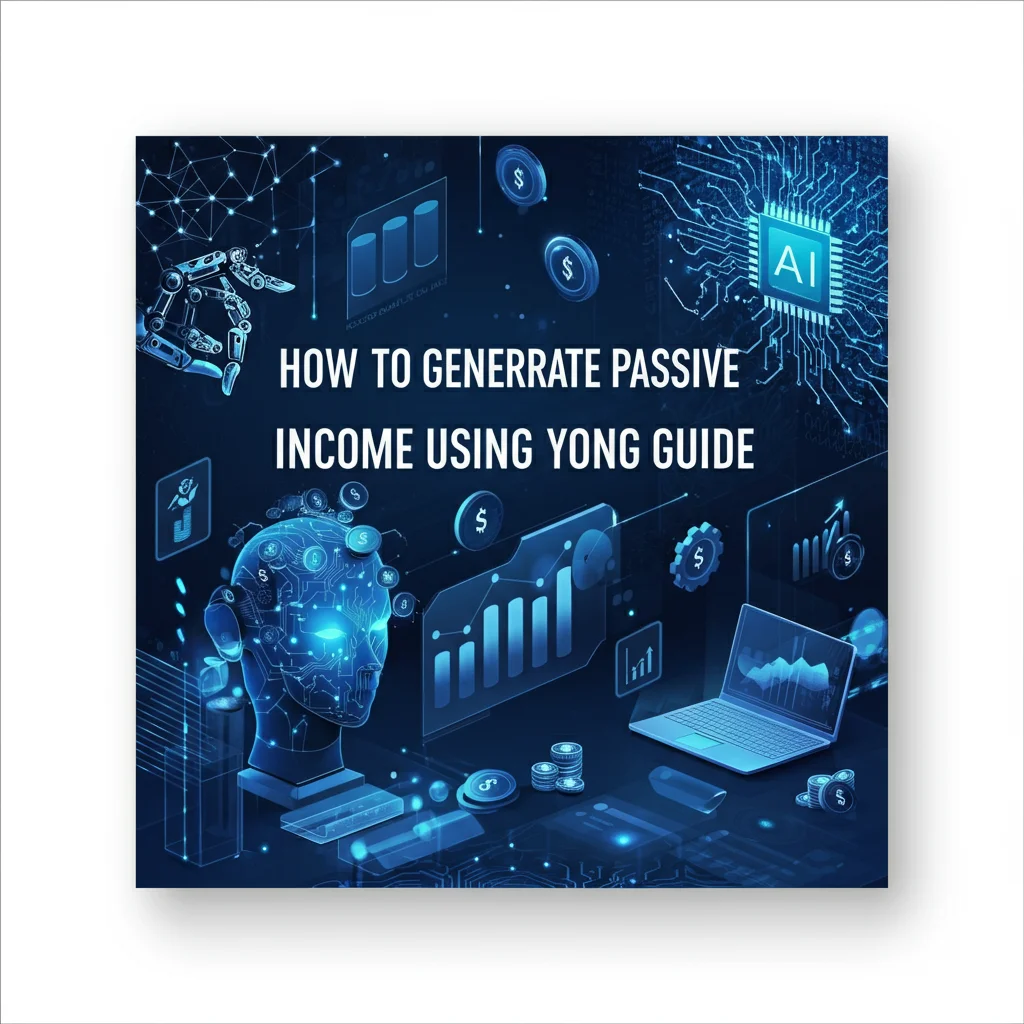Passive income represents the holy grail of financial freedom—earning money whilst you sleep, travel, or pursue other interests. Traditionally, building passive income streams required significant upfront capital, extensive market knowledge, or years of content creation. Artificial intelligence has fundamentally changed this landscape.
AI automation now enables individuals to create multiple income streams with minimal ongoing effort. From algorithmic trading systems that execute trades automatically to AI-generated content that earns royalties, technology has democratised passive income generation. This transformation means you no longer need to be a financial expert or creative genius to build sustainable income streams.
For tech-savvy individuals, investors, content creators, and entrepreneurs, AI presents unprecedented opportunities to generate passive income. This guide explores how to generate passive income using AI with proven methods, complete with real success stories, practical implementation strategies, and honest assessments of potential risks. Whether you’re looking to supplement your current income or build towards financial independence, these AI-driven approaches offer scalable solutions for the modern economy.
AI-Driven Stock Trading

Algorithmic trading platforms have revolutionised how individuals participate in financial markets. These sophisticated systems use machine learning algorithms to analyse vast amounts of market data, identify patterns, and execute trades automatically based on predetermined criteria.
Modern AI trading platforms simultaneously process news sentiment, technical indicators, market volatility, and historical patterns. This comprehensive analysis enables rapid decision-making that would be impossible for human traders to match. The systems can execute trades within milliseconds of identifying opportunities, capitalising on market inefficiencies that disappear quickly.
John, a tech enthusiast from Manchester, exemplifies the success of AI-driven stock trading. Initially sceptical about automated systems, he started with a modest £5,000 investment in an AI trading platform. The algorithm analysed his risk tolerance and financial goals, creating a diversified portfolio strategy. Over 18 months, John’s account generated consistent monthly returns, averaging 8-12%, providing him with reliable passive income while requiring minimal daily involvement.
The benefits extend beyond simple automation. AI trading systems eliminate emotional decision-making, a common pitfall for individual investors. They maintain disciplined strategies even during market volatility, avoiding panic selling or euphoric buying that often destroys returns. Additionally, these systems operate 24/7, capturing opportunities in global markets across different time zones.
However, AI-driven stock trading carries significant risks. Market volatility can overwhelm even sophisticated algorithms, particularly during unprecedented events like the 2020 pandemic crash. Past performance doesn’t guarantee future results, and AI systems can amplify losses as quickly as they generate profits. Furthermore, most platforms charge management fees that can erode returns, particularly for smaller accounts.
AI-Generated Music

The music industry has embraced AI-generated content, creating new opportunities for passive income through royalty-free music platforms. AI music generation tools can compose original tracks across various genres, from ambient background music to upbeat commercial jingles, without requiring traditional musical training.
Platforms like Amper Music, AIVA, and Boomy enable users to create professional-quality tracks by simply selecting mood, tempo, and genre parameters. The AI handles composition, arrangement, and production, generating unique tracks that can be licensed for commercial use. This democratisation of music creation means anyone can build a catalogue of original compositions for passive income.
Emily, a London-based marketing professional with no formal musical training, discovered AI music generation during the pandemic. Using various AI platforms, she created over 200 tracks spanning meditation music, corporate backgrounds, and podcast intros. After uploading her catalogue to multiple licensing platforms, Emily now earns £800-1,200 monthly in royalties from her AI-generated music library.
The advantages of passive income are compelling. Once uploaded, AI-generated tracks continue to earn royalties indefinitely without requiring additional effort. The demand for royalty-free music spans numerous industries—from YouTube creators to corporate presentations—ensuring consistent market demand. Additionally, AI tools enable rapid content creation, allowing users to build extensive catalogues quickly.
Copyright concerns represent the primary challenge in AI music generation. Legal frameworks haven’t fully addressed the ownership of AI-generated content, creating potential disputes. Some platforms explicitly prohibit AI-generated music, limiting distribution opportunities. Quality can also vary significantly between different AI tools, necessitating careful selection and potentially multiple subscriptions to access the most effective systems.
AI-Powered Chatbots for E-commerce
E-commerce businesses increasingly rely on AI chatbots to handle customer inquiries, process orders, and drive sales. These intelligent systems can manage multiple conversations simultaneously, providing instant responses while learning from each interaction to improve performance over time.
Modern AI chatbots seamlessly integrate with e-commerce platforms, customer relationship management systems, and payment processors to create a unified shopping experience. They can recommend products, answer technical questions, process returns, and even handle complex customer service scenarios that previously required human intervention.
Sarah, an e-commerce entrepreneur from Bristol, implemented AI chatbots across her online fitness equipment store. The chatbots handle product inquiries, guide customers through selection processes, and follow up with personalised recommendations. This automation increased her conversion rate by 35% whilst reducing customer service costs. The chatbots now generate additional revenue through affiliate commissions and upselling, creating a passive income stream that earned Sarah over £2,000 monthly.
The earning potential stems from multiple sources. Commission-based partnerships with complementary businesses can generate income when chatbots recommend relevant products. Improved customer service leads to higher retention rates and increased lifetime value. Additionally, chatbots can identify upselling opportunities more consistently than human staff, boosting average order values.
Success requires strategic implementation. Chatbots must be trained on comprehensive product knowledge and common customer scenarios to provide users with practical assistance. Regular monitoring ensures responses remain accurate and helpful. Integration with existing systems requires technical expertise, potentially resulting in professional setup costs. Performance optimisation involves continuous refinement based on customer interactions and feedback.
AI-Authored E-books
AI writing tools have transformed e-book creation, enabling rapid production of content across virtually any topic. These systems can research subjects, outline chapters, write compelling copy, and even suggest marketing strategies for publication.
Platforms like GPT-based writing assistants, such as Jasper and Copy.ai, can generate book-length content on topics ranging from self-help to technical tutorials. The AI handles research, maintains a consistent tone and style, and structures information logically. This capability enables individuals to author multiple books simultaneously across different niches.
David, a freelance consultant from Edinburgh, leveraged AI writing tools to create a series of business e-books. Starting with his expertise in project management, he leveraged AI to expand into related areas, such as team leadership and productivity systems. His AI-assisted e-books now generate £1,500 to £ 2,500 monthly through Amazon Kindle Direct Publishing and other platforms.
The scalability advantage is substantial. Traditional book writing requires months of research and writing, limiting output to one or two books annually. AI assistance enables authors to produce multiple books monthly, building extensive catalogues quickly. The global reach of digital publishing platforms means 24/7 earning potential across international markets.
Ethical considerations require careful attention. AI-generated content must be edited and fact-checked to ensure accuracy and originality. Plagiarism concerns arise when AI systems potentially reproduce existing content. Quality control becomes crucial, as poorly written AI-generated content can damage an author’s reputation and platform rankings. Disclosure of AI assistance may be required on specific platforms, which could impact reader perception.
Future Trends in AI Passive Income
The integration of AI and blockchain technology promises more secure and transparent passive income opportunities. Smart contracts can automate revenue sharing, royalty distribution, and investment management whilst providing immutable records of transactions. This combination enables new models for decentralised content monetisation and collective investment strategies.
AI-driven, decentralised autonomous organisations (DAOs) represent emerging opportunities for generating collective passive income. These systems enable groups of investors to pool resources for AI-managed investment strategies, sharing returns proportionally whilst reducing individual risk exposure. The transparency and automation inherent in DAOs could democratise sophisticated investment strategies previously available only to institutional investors.
Personalised financial advisors powered by AI will become increasingly sophisticated, offering tailored passive income strategies based on individual circumstances, risk tolerance, and financial goals. These systems will continuously optimise portfolios, identify new opportunities, and adjust strategies based on changing market conditions and personal situations.
The expansion of AI applications in the creative industries continues to accelerate. AI-generated art, video content, and interactive media create new monetisation opportunities for passive income. As these technologies continue to improve, the quality gap between AI-generated and human-created content will narrow, thereby expanding market acceptance and earning potential.
Automated content creation and marketing systems will enable comprehensive passive income ecosystems. AI tools will handle content generation, distribution, audience engagement, and performance optimisation simultaneously, creating truly hands-off income streams that require minimal ongoing management.
Challenges and Risks to Consider
Market volatility remains a significant concern for AI-driven investment strategies. Whilst AI systems can process information quickly, unprecedented market events can overwhelm algorithmic responses. The 2020 market crash and subsequent recovery demonstrated how rapidly market conditions can change, potentially rendering historical data irrelevant.
Algorithmic bias poses ongoing challenges across all AI applications. Training data limitations can create systems that perpetuate existing biases or fail to account for diverse scenarios. This bias can lead to suboptimal decisions in trading, content creation, or customer service applications, potentially impacting the generation of passive income.
Copyright and intellectual property issues surrounding AI-generated content remain largely unresolved. Legal frameworks haven’t adapted to address ownership questions for AI-created works, creating potential liability for individuals monetising such content. This uncertainty could impact the long-term sustainability of income from AI-generated creative works.
Technical expertise requirements can create barriers for some individuals. Whilst AI tools have become more user-friendly, optimal implementation often requires an understanding of underlying technologies, platform integrations, and performance optimisation strategies. This knowledge gap may limit accessibility for users who are less technically inclined.
Data privacy concerns are particularly relevant for AI systems that require access to personal or financial information. Ensuring compliance with regulations, such as GDPR, while maintaining system effectiveness requires careful attention to data handling practices and security measures.
Building Your AI-Driven Passive Income Strategy
The convergence of artificial intelligence and passive income generation presents unprecedented opportunities for financial independence. From algorithmic trading systems that work around the clock to AI-generated content that earns royalties indefinitely, these technologies have democratised wealth creation in ways previously unimaginable.
Success requires a balanced approach that acknowledges both opportunities and risks. Start small with one or two AI-driven income streams, allowing time to understand the systems and optimise performance before expanding. Diversification across multiple AI passive income methods can reduce risk whilst maximising earning potential.
The future of AI-generated passive income is evolving rapidly. Early adopters who understand these technologies and implement them strategically will be best positioned to capitalise on emerging opportunities. Whether you’re exploring Business Ideas Using AI Tools or seeking to automate existing income streams, the key lies in taking action while remaining informed about technological developments and market changes.
Begin your AI passive income journey today by selecting one method that aligns with your skills and interests. With proper implementation and ongoing optimisation, these AI-driven strategies can provide the financial freedom you’ve been seeking.
FAQ About how to generate passive income using AI
What is passive income?
Passive income is earnings generated with minimal effort or active involvement once the initial setup is complete. Examples include rental income, royalties, or income from automated systems like AI-driven platforms.
How can AI help generate passive income?
AI can assist in creating passive income by automating tasks such as trading, content creation, managing marketing campaigns, or even creating digital assets. These systems can run with little human intervention, saving time and maximising efficiency.
Is AI-driven passive income suitable for beginners?
Yes, many AI tools are designed with user-friendly interfaces, enabling even beginners to leverage them effectively. However, it’s crucial to research and understand the tools you use to ensure success.
What are some risks of relying on AI for passive income?
While AI offers numerous opportunities, risks include technological failures, incorrect setups, or volatility in markets like algorithmic trading. Minimising these risks involves thorough research, regular monitoring, and diversification of income streams.


